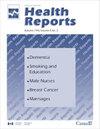Sleep behaviours among Canadian adults: Findings from the 2020 Canadian Community Health Survey healthy living rapid response module.
IF 3.3
2区 医学
Q2 PUBLIC, ENVIRONMENTAL & OCCUPATIONAL HEALTH
引用次数: 5
Abstract
INTRODUCTION The Canadian 24-Hour Movement Guidelines for Adults, released in October 2020, recommend 7 to 9 hours of good-quality sleep for adults aged 18 to 64 and 7 to 8 hours for adults aged 65 and older, on a regular basis, with consistent sleep and wake times for health benefits. This study assesses the sleep behaviours of Canadian adults and how these behaviours align with the recommendations. DATA AND METHODS This cross-sectional study uses nationally representative data from the 2020 Canadian Community Health Survey healthy living rapid response module (N = 9,248), collected from January to March 2020. Sleep behaviours were self-reported by respondents, and descriptive statistics were used to calculate means or percentages for sleep duration, guideline adherence, physical activity and screen time, sleep timing, and sleep variability in the full sample. This was done by age, sex, household education, household income adequacy and employment status. RESULTS Mean sleep duration was 7.9 hours for adults aged 18 to 64, with 77% meeting sleep duration recommendations, and 8.1 hours for adults aged 65 and older, with 55% meeting sleep duration recommendations. Among adults aged 18 to 64, 61% reported high sleep quality, compared with 71% among adults aged 65 and older. High sleep variability (≥30-minute difference between work and free days) and poor sleep-facilitating behaviours were prevalent. Adults who reported high sleep quality and high sleep variability were more likely to meet sleep duration recommendations. INTERPRETATION To maximize health benefits, continued efforts are needed to promote good sleep behaviours among Canadian adults. Device-based measures of sleep could improve surveillance and research.加拿大成年人的睡眠行为:来自2020年加拿大社区健康调查健康生活快速反应模块的发现。
2020年10月发布的《加拿大成人24小时运动指南》建议,18至64岁的成年人应定期保持7至9小时的高质量睡眠,65岁及以上的成年人应保持7至8小时的高质量睡眠,并保持一致的睡眠和醒来时间,以获得健康益处。这项研究评估了加拿大成年人的睡眠行为,以及这些行为与建议的一致程度。数据和方法本横断面研究使用了2020年加拿大社区健康调查健康生活快速反应模块中具有全国代表性的数据(N = 9248),收集时间为2020年1月至3月。受访者自我报告睡眠行为,并使用描述性统计来计算整个样本中睡眠持续时间、指南依从性、身体活动和屏幕时间、睡眠时间和睡眠变异性的平均值或百分比。这是按年龄、性别、家庭教育、家庭收入是否充足和就业状况分列的。结果18至64岁的成年人平均睡眠时间为7.9小时,77%符合睡眠时间建议;65岁及以上的成年人平均睡眠时间为8.1小时,55%符合睡眠时间建议。在18岁至64岁的成年人中,61%的人睡眠质量高,而65岁及以上的成年人中这一比例为71%。较高的睡眠变异性(工作日和休息日之间的差异≥30分钟)和较差的睡眠促进行为普遍存在。报告睡眠质量高、睡眠变异性高的成年人更有可能达到建议的睡眠时间。解释:为了最大限度地提高健康效益,需要继续努力促进加拿大成年人的良好睡眠行为。基于设备的睡眠测量可以改善监控和研究。
本文章由计算机程序翻译,如有差异,请以英文原文为准。
求助全文
约1分钟内获得全文
求助全文
来源期刊

Health Reports
PUBLIC, ENVIRONMENTAL & OCCUPATIONAL HEALTH-
CiteScore
7.30
自引率
4.00%
发文量
28
期刊介绍:
Health Reports publishes original research on diverse topics related to understanding and improving the health of populations and the delivery of health care. We publish studies based on analyses of Canadian national/provincial representative surveys or Canadian national/provincial administrative databases, as well as results of international comparative health research. Health Reports encourages the sharing of methodological information among those engaged in the analysis of health surveys or administrative databases. Use of the most current data available is advised for all submissions.
 求助内容:
求助内容: 应助结果提醒方式:
应助结果提醒方式:


